Listen:
Check out all episodes on the My Favorite Mistake main page.

My guest for Episode #58 is Tom Peters, the legendary management speaker and consultant, author of 19 books including his latest: Excellence Now: Extreme Humanism.
You can also watch or listen to my interview with Tom back in August 2020 in my Lean podcast series.
Today, we talk about Tom's “favorite mistake” of getting fired from the consulting firm McKinsey for reasons that might include the long hair he had at the time.
FOUND! The long hair that contributed (perhaps) to his firing… and maybe he got a haircut before getting this photo taken for the dust jacket for In Search of Excellence. See Tom's comment below.
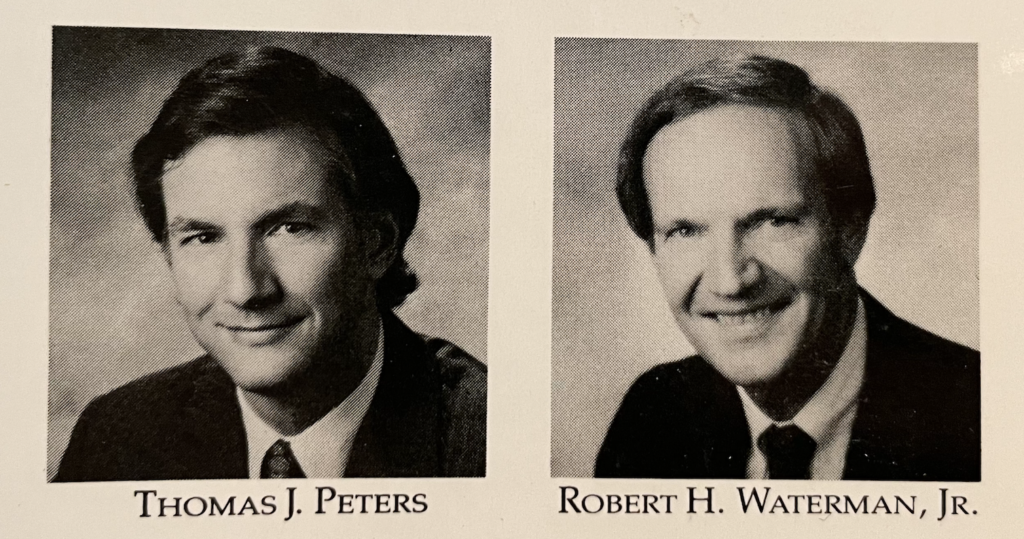
“This was about two years after I left McKinsey. Hair when I left down to my shoulders. This pic is a buzz cut by comparison.”
Questions and Topics:
- Why and how Tom got “caught up in the work” and “forgot the rules” while working at McKinsey
- Why he hates “successful people who think they deserve their success”
- What is humanism? What is “exteme humanism”?
- Innovation means whoever tries the most stuff wins?
- Why we should hire people who are “decent” and “nice”
- Why research shows it's a mistake to not have 50% women in your executive team
- Why it's a mistake to think only “noisy” people are the most creative, the best at sales, the best leaders
- Tom Peters' party mistakes
Books He Mentions:
- Compassionomics (The Revolutionary Scientific Evidence that Caring Makes a Difference)
- Warren Buffett Invests Like a Girl: And Why You Should, Too
- Quiet: The Power of Introverts in a World That Can't Stop Talking
Watch the Full Episode:
Quotes:
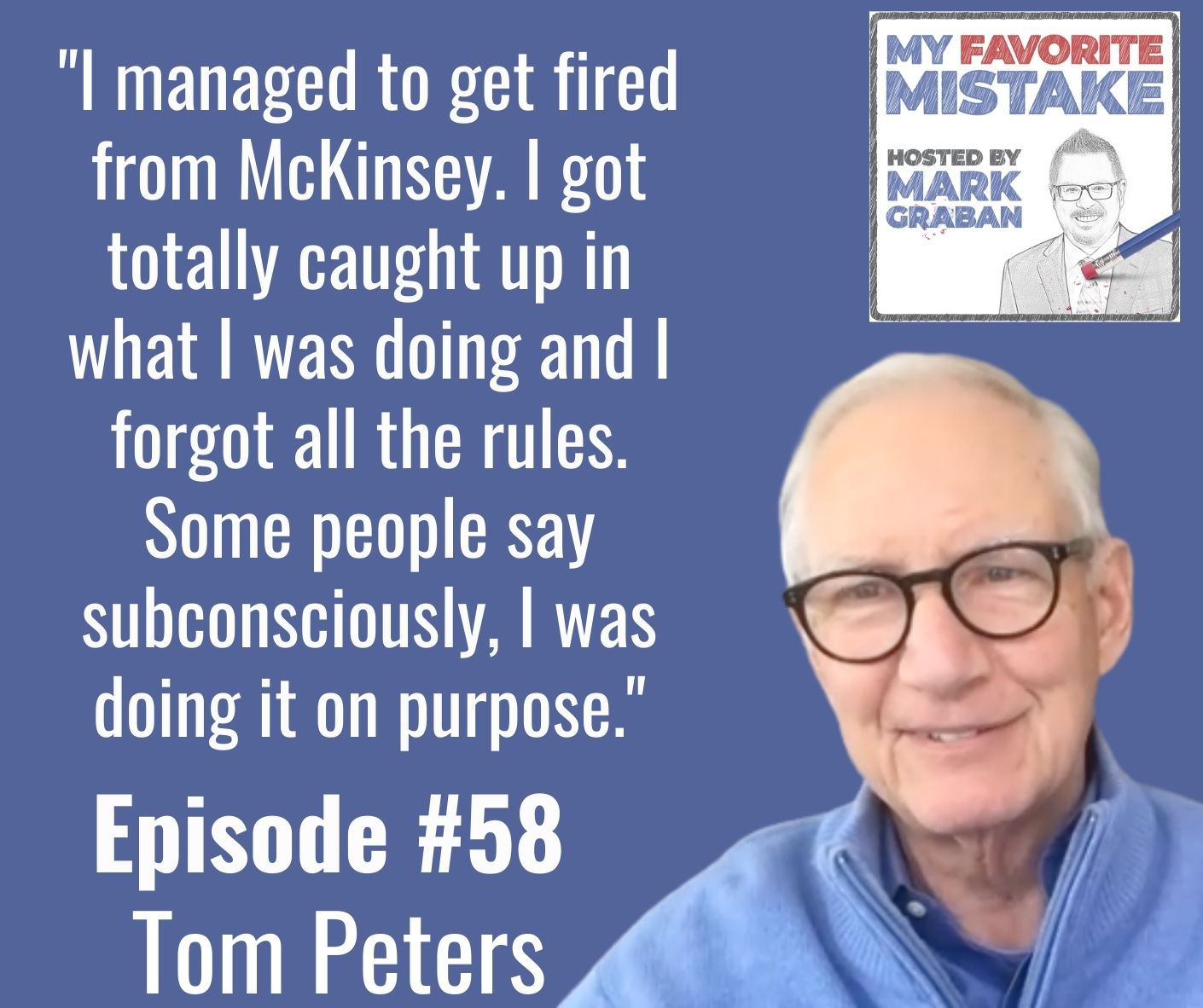
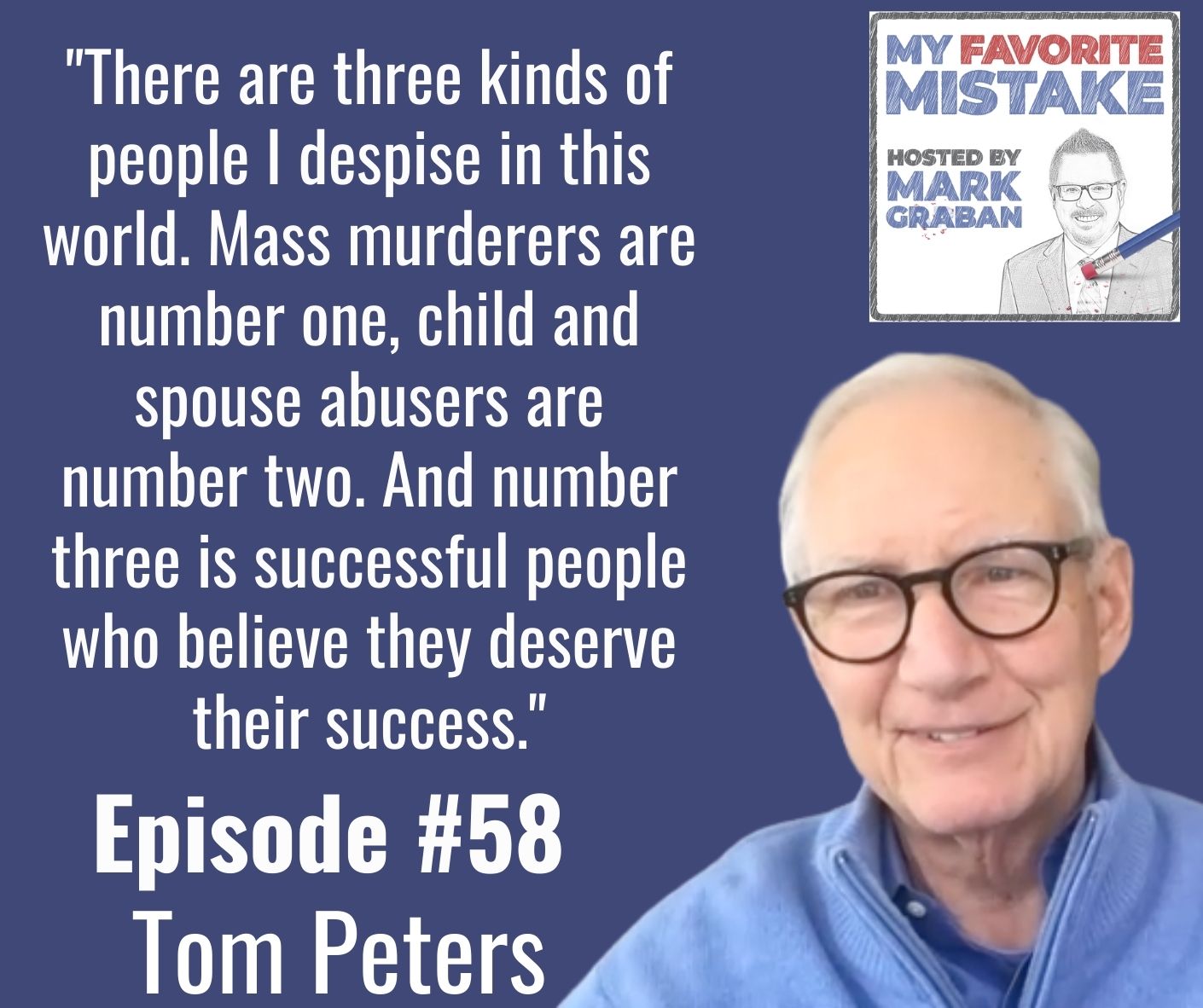
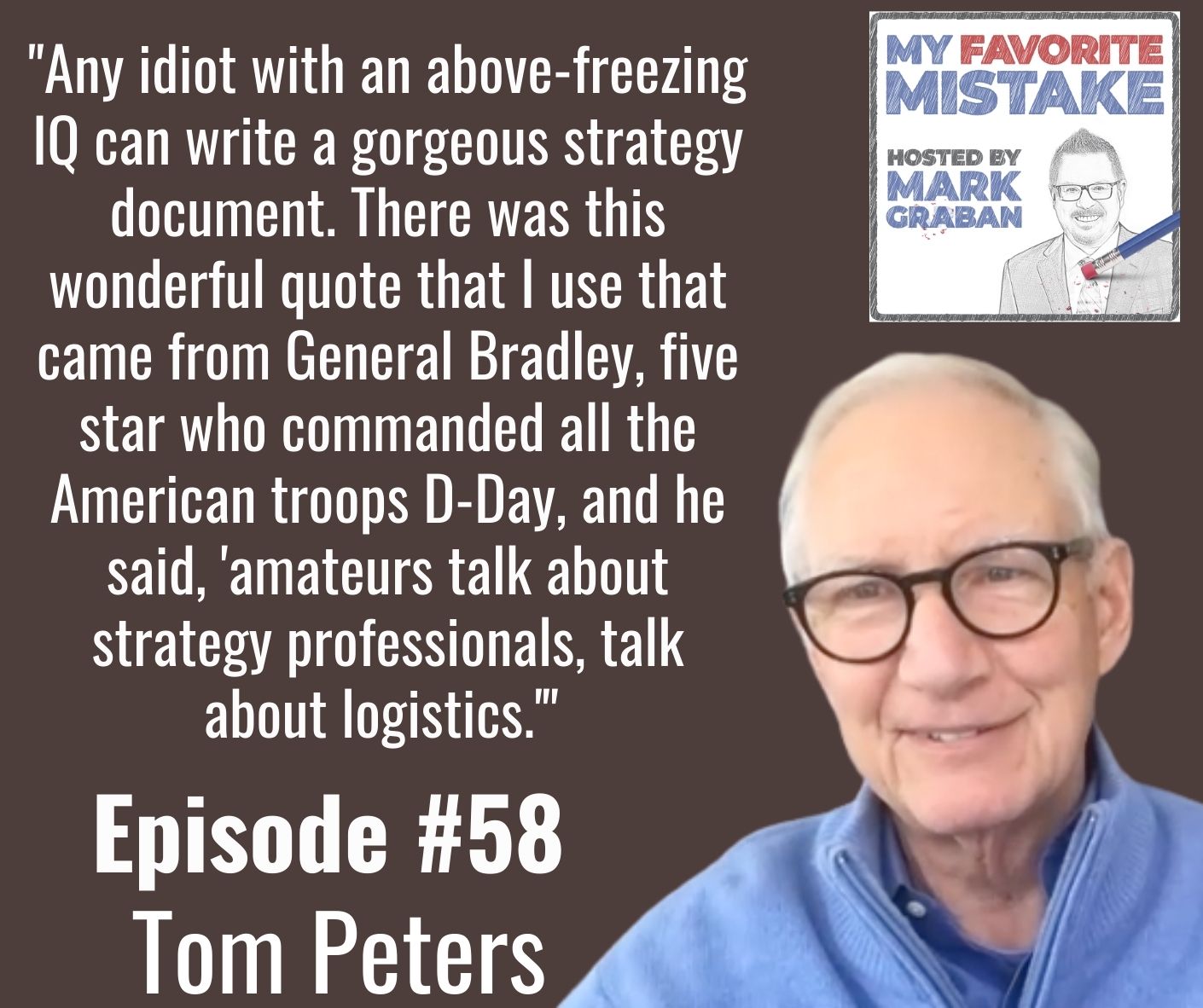
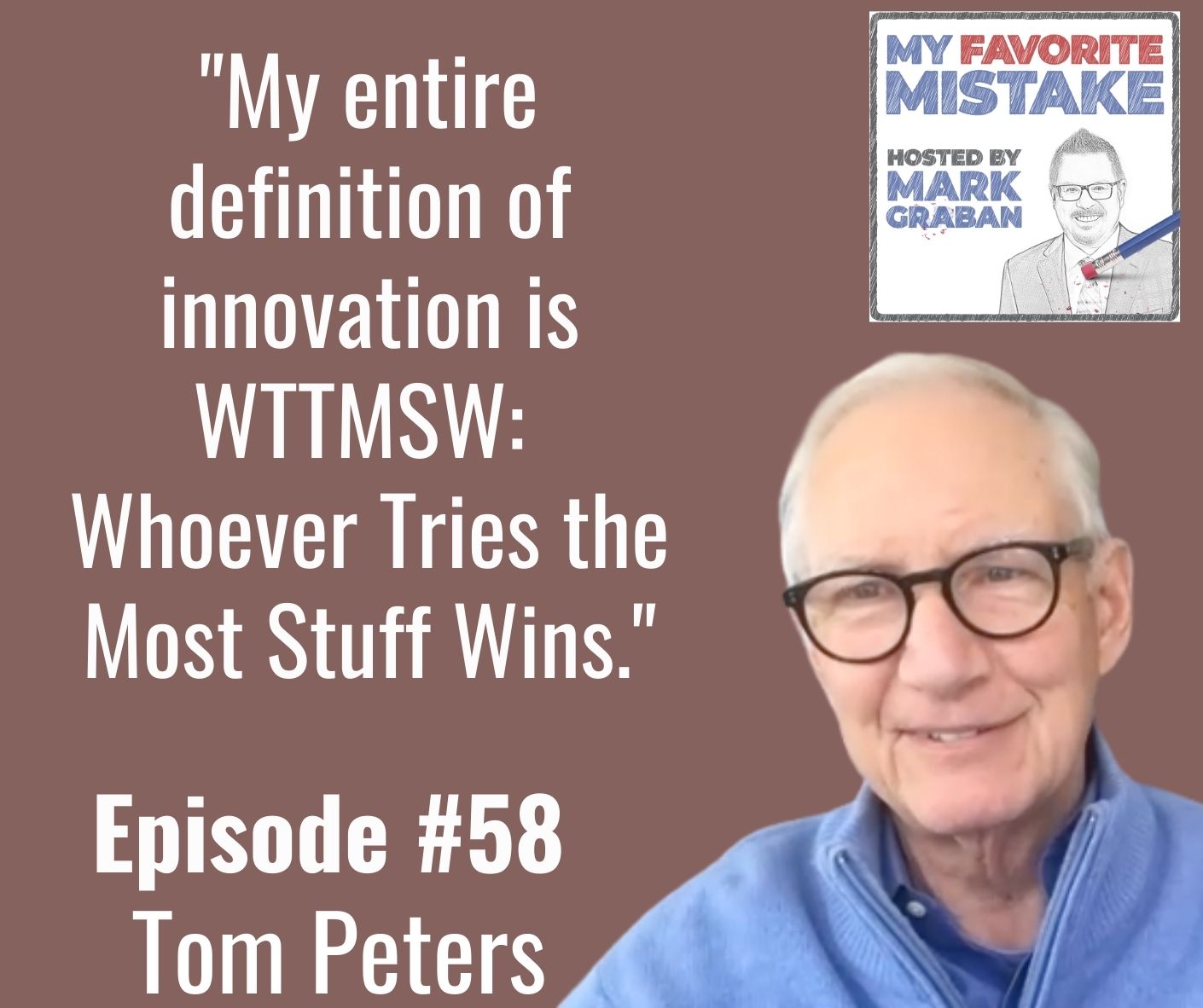
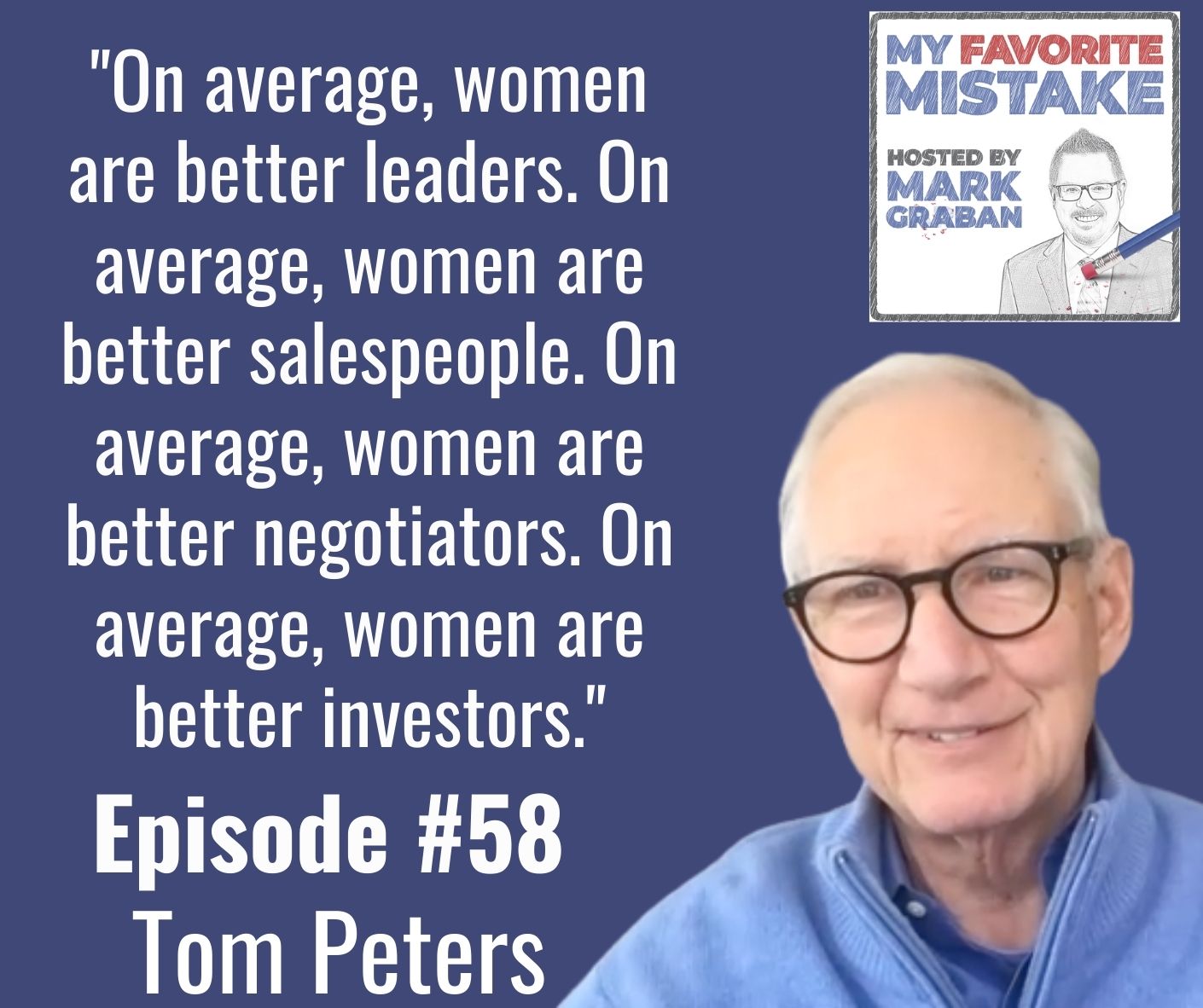
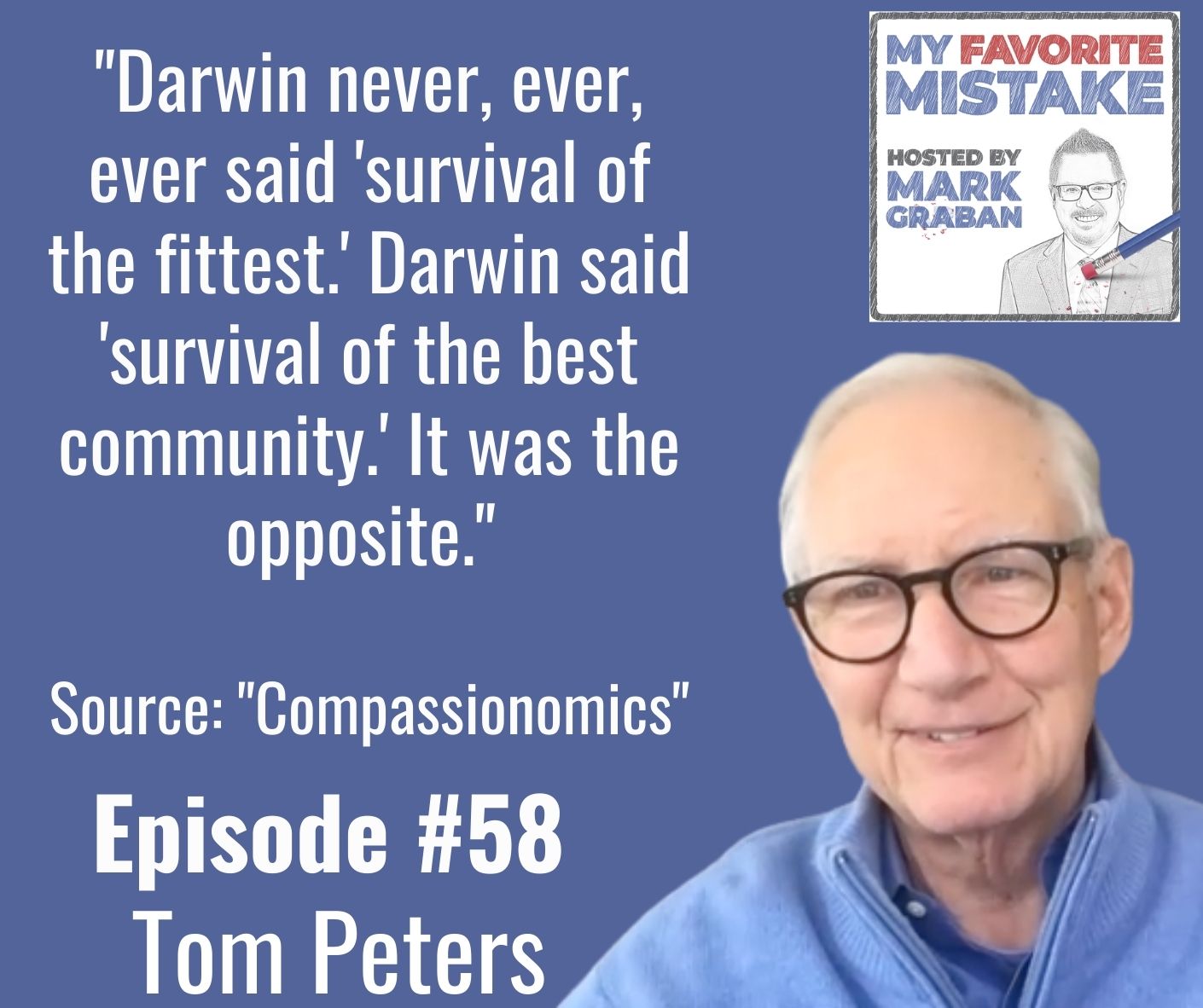
Subscribe, Follow, Support, Rate, and Review!
Please follow, rate, and review via Apple Podcasts or Podchaser or your favorite app — that helps others find this content and you'll be sure to get future episodes as they are released weekly. You can also become a financial supporter of the show through Anchor.fm.
You can now sign up to get new episodes via email, to make sure you don't miss an episode.
This podcast is part of the Lean Communicators network.

Other Ways to Subscribe or Follow — Apps & Email
Tom Peters On Getting Fired From McKinsey
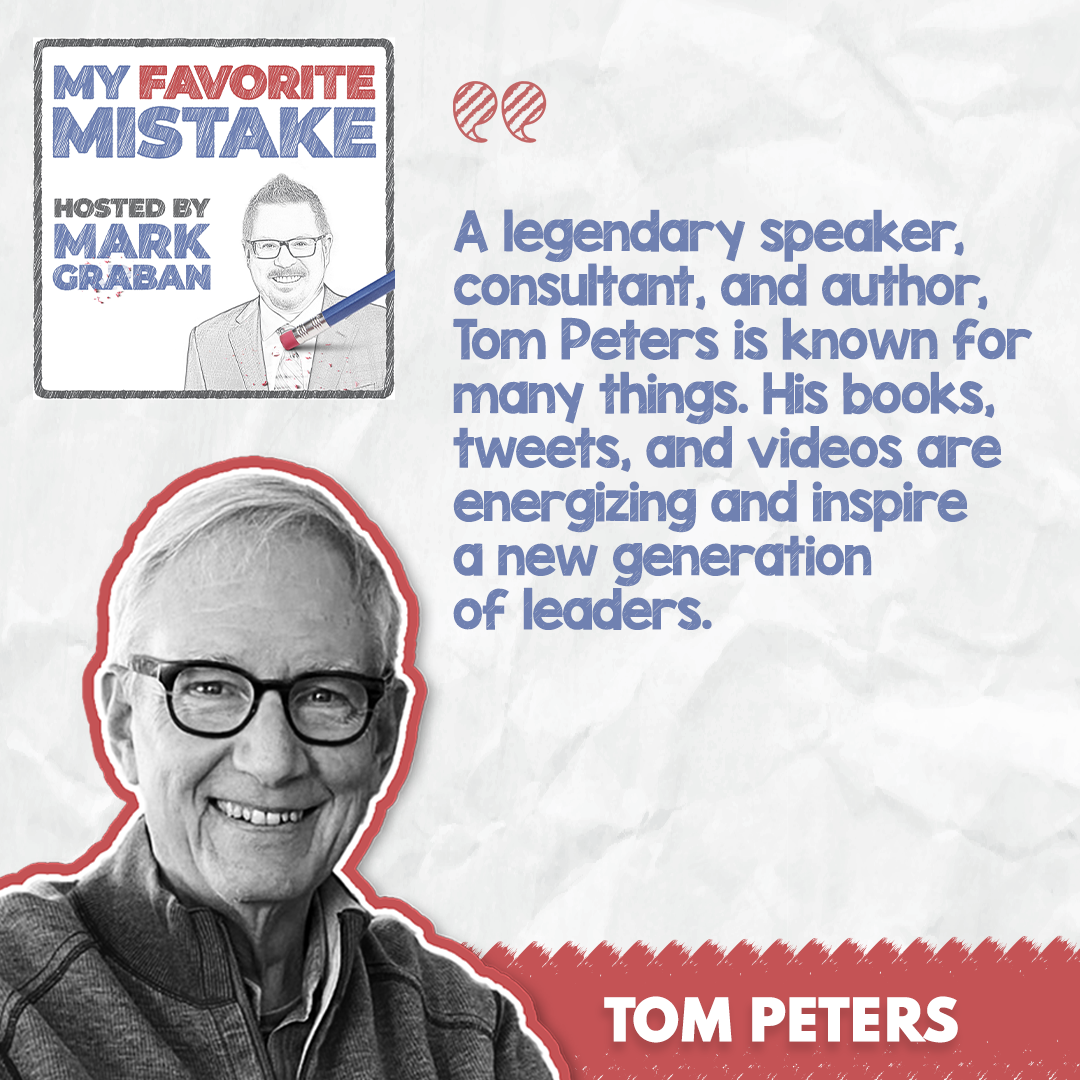
Episode 58, Tom Peters, author of Excellence Now: Extreme Humanism. I am joined by someone who is a real energy booster. He is the one, the only Tom Peters. Thank you for being here. I appreciate it.
It is my pleasure. I’m going to have problems with your basic thesis because I have made many mistakes. I presume we got a minimum of an hour and a half.
We can make this a series. I find Tom’s books energizing, his tweets and videos. Tom is known for many things. He is the author of nineteen, including going back to 1982, In Search of Excellence, Thriving On Chaos, 1987, and many books later. The latest is called Excellence Now: Extreme Humanism. I’m excited to talk about that. Looking back at an interesting career, give it your best shot in terms of rankings. Do you have a favorite mistake that you can tell us about?
I had to work my ass off, but I managed to get fired from McKinsey. McKinsey is in the midst of its scumbag period, but we will avoid that, or we can talk about it if we want to. Fundamentally, I was working on the research on In Search of Excellence. The backstory of that would take us forever. I got caught up in what I was doing, and I forgot all the rules. Some people say, “I was doing it on purpose.” In 1977, at a place like McKinsey, you did not wear hair that came down to your shoulders. You did not sign up for the teacher course at the Stanford Business School and did not bother to tell McKinsey that you were going to do it. I wasn’t thinking of sticking it in their ear, but I was sticking it in their ear.
I managed to get fired from McKinsey. I got totally caught up in what I was doing, and I forgot all the rules. Some people say that subconsciously, I was doing it on purpose. Click To TweetThey finally came through and should have come through and tossed me out. I don’t like to talk about money, but I will this one time. In Search of Excellence was not supposed to sell. The first print run was $3,000. They thought that was generous and wild. When I got fired from McKinsey, I had to sign an agreement on royalties and I ended up percentage-wise as I should have with 50% of the royalties. I paid $25,000 for that. God knows what came in, but it wasn’t $25,000.
It is the story of my life. I was wrapped up in the project that I didn’t give a s***. I didn’t care that McKinsey said this and that. I knew I was treading on water. My co-author, Bob Waterman, once said to somebody, “My major contribution to the book was spending 70% of my time keeping Tom out of trouble.” That number is a little high, but I’m not sure. Would I do anything differently in that regard? This is true. I don’t know what kinds of answers you get, in general. If you are passionately engaged in something, the logic goes out the window, and 7 out of 8 times, it goes bust. On the eighth time, if you are lucky, and we had perfect timing with In Search of Excellence, you knock it out of the ballpark or Dodger Stadium as they are saying.
You did have long hair. You were in the Seabees. You had worked in the Nixon White House. I have trouble picturing you with long hair.
You could not find a more established career. Growing up next to the Naval Academy, you had that sniff around you. I go to Cornell to be an engineer. I go to the Navy for four years, including a couple of years in Vietnam. I come out of the Navy and go to the Stanford Business School. From there, you go to McKinsey. My oldest son, I’m not going to go through what he does, but I adore him because his career doesn’t look like mine. He didn’t check every frigging box thing. I don’t know, Mark. It must have been explosive. I don’t remember having thought, “I have had enough and I want to get out of here.
It was awful when I was fired to my psyche. I was doing what I was doing. My damned head was down. I don’t like to say I wasn’t paying attention, but I wasn’t paying attention. I had no idea why the hell I grew the hair long unless it was to flip the bird at McKinsey. I love to talk to a shrink about it sometime, but it wasn’t a thing. I blew myself up.
It sounds like it caught you by surprise, looking back at it in hindsight. It made sense why they fired you.
I was a high-performing person at McKinsey. I was getting all sorts of stuff. I had this Stanford course that I was teaching. Teaching at Stanford is no small thing. I was doing research that I loved doing, and I knew I was pushing the limits, but I sure as hell never thought they would pull the trigger. It did come out of the light blue, if not out of the dark blue. There is no way to unravel the story easily. The book was a wild success.
Our book was a darn decent book. God put his hand down on Bob and my head and gave us the perfect timing in the history of the world. The week the book was published, President Reagan announced 10% unemployment, and we hadn’t had that number since the Great Depression. We were getting the tar beaten out of us by the Japanese.
It was simple. Their scars worked, and ours didn’t. The Americans who had come out of World War II as the planetary gods were getting the heck beaten out of them. With that timing of the 10% unemployment, I said to somebody, “All around the country, the business books moved from the back of the bookstore to the front of the bookstore.” It was perfect timing. We can come back to that because it is a good life lesson.
There are guests who have stories where their mistake leads to better things, which is what makes it a favorite. What is the life lesson that you took away from this? The one thing I hear is, “Sometimes good things follow a setback.”
I’m going to give you a lousy answer, but you can figure out whether I’m giving you a lousy answer or not. I would bet, statistically, when you get engrossed in something and follow your passion, you are not going to end up with a number-one bestseller in the world. My lesson, and I’m not sure where it came from, is if you fall in love with something, give it your all. I didn’t care whether the damn book sold or not. I couldn’t believe that anybody had given us a book contract. I was giving speeches on the material, and people were interested in it. I fell more deeply in love with the subject matter and let everything else be damned.
I don’t know how to answer your question because I love to give you the easy answer. Follow your passions, but that’s not quite right. I followed my passions and got lucky. There are a lot of people who follow their passions that are completely moral and legal, and they don’t get lucky. This is important. We can tie it into your subject matter. There are three kinds of people I despise in this world. Mass murderers are number one, child and spouse abusers are number two number, and number three are successful people who believe they deserve their success.
There are three kinds of people I despise in this world. Mass murderers are number one. Child and spouse abusers are number two. Number three is successful people who believe they deserve their success. Click To TweetI was in London and this guy was driving me around town. I don’t know what we were chatting about, but it was Lincoln Continental. I was in the back seat or whatever the British equivalent of Lincoln Continental is. He said to me, “There are two kinds of people who ride in the backseat of this car.” I said, “Okay, I’m all ears.” He said, “There are people who remember their roots and people who think they deserve to be there.”
There are many random things that happen to you in life. I was thinking about it. I have a new car, a Subaru Outback, but it has a huge center console, and I’m still learning it. I’m never looking at the road. I’m always looking at the console. I know I should, and I’m old. My reactions are not as good as they were. I can’t imagine what it would be to seriously wound or kill someone. At some level, every damn trip I take is a lucky break when I come back without it. I know the deal to slow down, pay attention, and so on, but here is the screen, and it keeps yelling at me. At any rate, it’s luck. I won’t go anywhere beyond that topic.
I agree with the guy who was driving me around. We are talking about racial equality as we should be. Do you think I would be here and have had this success had I not been born in 1942 with White male American, smart parents from the best country in the world to be from? At some level, that was the all-important first 99.5% and the rest were details. I got pissed off after the George Floyd thing when people said, “What is this White privilege stuff you talk about? I don’t have any White privilege.” I sure do. There is no question about that whatsoever.
It is a mistake to deny that or discount that. People say, “I had to work hard.” Privilege doesn’t mean things are easy, but this idea of White privilege means, to your point, certain things are easier.
You get born in 2021 to incredibly wealthy parents. They are buying the football coach a house. They can get him into Southern Cal, Stanford, or wherever else it happens to be. That wasn’t your doing.
A mistake is thinking that success is completely the output of your own effort or talent and not also based on factors that weren’t your choice.
This is not the way my mother brought me up. It says, “Enjoy your life. Enjoy every day. There is not a straight road trajectory from where you are to where you want to get to. There will be setbacks on top of setbacks. There will be lucky breaks.” It is important to know you can’t control everything because, among other things, it is incredibly important.

There are a lot of things you write about in your book that you think are important. I like to explore that a little bit. Looking at the title Extreme Humanism, how do you define humanism? What is, in a good way, an extreme version of that? What are some of those traits or characteristics of leaders?
I have written nineteen books. I have been doing whatever I’m doing for many years. It started out with In Search of Excellence research. Fundamentally, I would love to have somebody buy all nineteen books because I get nineteen royalties. The reality is it is one book repeated eighteen subsequent times. The big message was people first. People, not spreadsheets.
I hate to use the word luck with this. I called the book serendipity. The messages I have been talking about for many years took on ten times their urgency last March 2021, when the pandemic began. People first and decent behavior toward all of your colleagues. People first was the heart of it. Execution is 100 times more important than strategy. Any idiot with an above-freezing IQ can write a gorgeous strategy document.
There was this wonderful quote that I used that came from General Bradley, eventually five stars, who commanded all the American troops on D-Day. He said, “Amateurs talk about strategy. Professionals talk about logistics.” It is those boring, dull details that also play right again into the people first thing. I will come to your hotel because it is gorgeous and has a great location. I come back because the housekeeping department is great. It is spotless to the point that it glistens. That is the repeat business thing. That is when I put my finger on my mouse and started recommending you to other people.
Any idiot with an above-freezing IQ can write a gorgeous strategy document. A wonderful quote that I use came from General Bradley, a five-star general who commanded all the American troops on D-Day. He said, “Amateurs talk about strategy.… Click To TweetDesign is huge to me. It is huge in two dimensions. Jony Ive, the former Apple Chief Designer, said, “This may sound arrogant, but we hope to do things that contribute to humanity a little bit.” That can apply to any enterprise of any size. I did this little riff in the book, which said, “No such thing as a commodity.” It was 10, 12, or 15 attributes of a plumber who is not a commodity. It is everything from a clean truck to a clean uniform, politeness, showing up on time, and explaining to Mark what went wrong that made this thing happen so it might not happen again. There are 100 things. It is no different than owning a 300-room hotel. They differentiate you radically.
I’m trying to think what I would put on my top three relative to your show. You are more sophisticated than I am, but I have my entire definition of innovation. It is WTTMSW, Whoever Tries The Most Stuff Wins. The advanced version of that is Whoever Tries The Most Stuff and Screws The Most Stuff Up, The Fastest Wins. That is innovation.
My entire definition of innovation is WTTMSW: Whoever Tries The Most Stuff Wins. Click To TweetWhen Steve Jobs died and many of the obits said, “Steve Jobs was not an inventor.” He didn’t invent the iPhone. Blackberry was there. This is a perfect word. He was a thinkerer. He took something and he changed. In the end, it wasn’t even recognizable, but it wasn’t by sitting on a mountaintop and having an epiphany, which isn’t fair because he sat in Japanese tea gardens to understand the simplicity that is the basis of Apple’s success. That is another story.
What I hear you saying is if we are trying things, some of those things won’t work out, but let’s learn from it.
That is what Soichiro Honda said. The Honda founder said, “Success is that 1% that emerges from the 99% that is a failure.” We can’t argue with him.
One thing I see in your work when we talk about the importance of learning from mistakes. You talk about decent behavior. In this book, you talk about hiring people who are nice. I had worked in workplaces where managers would yell, scream, and blame when a mistake was made. I was like, “People don’t mean to make mistakes.” I would argue being nice doesn’t give people permission to screw up. I would say being kind, being constructive, and making sure people don’t hide and cover up mistakes are better for the business. What do you say?
I agree. I was trained in the behavioral sciences in part. The behavioral science is BF Skinner. He said, “Negative feedback does not cause people to get better. It causes them to leave the playing field and not try again.” In that regard, it’s 1 of the top 3 messages I love to leave indelibly in everybody’s head. The research says, “There ought to be 30 positives for every negative.” As you said about the nice thing, it doesn’t make you a chump.
Somebody had this little riff that I came across a couple of years ago, and it was new to me. They said, “The magic words are yes and rather than yes, but.” It is a great job, Mark, but you could have done more in chapter two. We can talk about some ways to make this better. That might sound like semantics, but the semantics, are like a 45 pistol being pointed at your head, and it is huge. There is a critical point here for our friends who are in sizable businesses, and by sizable, I don’t mean giants. I mean 50 or more. That is the most important living human beings in the organization are your first-line supervisors. They are responsible for everything.

Business leaders wouldn’t disagree with me, but they don’t spend the time they should on figuring out who to promote. They are total suckers for promoting a person who has the biggest sales numbers of the most technical skills. All of the leadership is 100.00000% people. If you got a tech problem, hire somebody who can deal with tech problems. Your job as a leader is the people, not the people half, but the people 99.5% part of it.
When you talk about leaders, one thing that you are vocal about on Twitter is the mistakes companies make, and there is research to back this up. It’s a mistake not to have 50% women in executive and leadership roles. Can you tell us about that?
If you read the section in the new book, and I’m not trying to urge reading the book, I’m making a different statement. I’m trained as an academic. I have a PhD from Stanford. I don’t open my mouth without data behind it. I was trained. My thesis advisor was the biggest son of the b**** that you have ever met in your life. I said to somebody, “If you want to understand Gene Webb, if you wrote in your thesis, the sun rose, you would have to cite Newton, for God’s sake. These are not off the top of my head.
Here is what the research says, two keywords for those who might get out of shape. On average, women are better leaders, salespeople, negotiators, and investors. If that is not enough for you, you have the other half of the coin, and it is that women buy everything. She is your customer. She buys 80% of all the consumer goods. In the United States, over 50% of professional purchasing agents are women. She is as likely to sign the RFP for the five-year $5 billion IS project. She is to pick the location of the family vacation.
On average, there are crappy women managers and there are fabulous male managers. Relative to the things I talk about, it is along the lines because you said, “Be clear to say there are many exceptions.” Women tend to be more empathetic. That is right out of Darwin. You4 and I made our money in those days by getting up early, sharpening our spears, and running around throwing spears at animals.
I read this wonderful book called Compassionomics. Darwin never said, “Survival of the fittest.” That was some other guy. Spencer was his name. Darwin said, “Survival of the best community.” It was the opposite. If you have a great community, you raise more children. If you raise more children, you have a bigger community that can develop itself. If you have a greater community, you grow more food coming out of the ground instead of depending on the spear chuckers. This is a wonderful book. I like you to buy my book, but I’m forcing you to buy Compassionomics. There is one story I’m going to tell out of that.
Darwin never ever said, “Survival of the fittest.” Darwin said, “Survival of the best community.” It was the opposite. Click To TweetYou have pointed out a mistake. People misunderstand or misportray Darwin. It often gets portrayed as this individualistic idea. What you are saying is that it is more along the lines of the phrase that some people mock this phrase, “It takes a village.” but it sounds like that is the case.
It also goes back to an earlier comment on the women’s thing. Men compete because we compete. Here is the investment story of why women are better investors. There is a whole book. Buy this next book. You don’t have to read it. It is worth it for the title. The book title written by a senior person, The Motley Fool, is Warren Buffett Invests Like a Girl and Why You Should Too.
On average, women are better leaders. On average, women are better salespeople. On average, women are better negotiators. On average, women are better investors. Click To TweetHere is the problem. We will go back to the F2F world. You and I are sitting at trading desks, and we know each other. You have a day, probably mainly luck, that is fabulous. It is an hour before the market closes. Mark is not going to beat my ass on Tuesday. I buy all sorts of risky crap in the last half hour with the sole purpose of beating Mark. It is insane, but that is the way we boys operate. It is a loser’s strategy. The people who are screaming that you were talking about are much more likely to be male than female. It is stunning.
One other question I want to ask you before we have to wrap up here. I’m an introvert. There is a little bit of selfish motivation in this question. You advocate for introverts. You say, “It is a mistake to think that noisy people are the best leaders, the best at sales, and the most creative.” Why is that?
I steal shamelessly with attribution from a book called Quiet, the author of whom is a woman by the name of Susan Cain. She was trained as a lawyer. There is no BS in this book. This is all hard-nosed research. It is such an incredible book. I was 70 when the thing came out. I thought, “You have implicitly been on the side of noisy people for the last several years.” Susan shows that is always the deal. The noisy guy gets the promotion, and the quiet guy is the best leader because he listens to people.

When they do all this group research where you put 10 introverts and 10 extroverts, and they work on some problem, the extroverts come up with 25 solutions, all of which are random bullshit. The introverts come up with three solutions, but they have been thought out. In baseball terms, the odds of getting at least a ground rule double are a lot higher for introverts.
I have been running around the world. I had been diminishing and dismissing the incredible importance of finding and promoting quiet people. She shows it a million times. The instinct is if somebody talks, that means she goes through all this stuff. If you talk a lot, you are more intelligent and physically attractive. All of these things are associated with noise.
It is deadly, which may surprise some people who are reading this. In Susan’s book, there is a good introvert and extrovert test. I bet I scored as high as you did on the introvert scale. It doesn’t mean I can’t give a good speech. My wife and I, in the days of F2F, have a Christmas party. There are 30 people there. It is an hour-long party. I always talk to the same person for an hour.
It is a classic example. I dig into you. We have this incredible conversation about what is going on in the world. The extrovert flits. Susan always grabbed me and said, “This is our party, Tom. You need to talk to someone.” We went to a summer party a couple of years ago. About a month later, I ran into the woman who was home. It was one of those things to do on a July 4th afternoon. I said to her, “Kate, I am embarrassed. We came to your party. I loved your party. I never came and said thank you for inviting us to the party.” I ran into Dick Smith right after I came in and we talked for the next hour and a half. That is what introverts tend to do.
I was not expecting to hear about Tom Peter’s party mistakes.
The other thing relative to the deeper phenomenon is there are personal mistakes I have made that I have no intention of sharing with you. Many years later, I am deeply ashamed of myself. Almost all of us have a few of those in our background. If you got a couple of those, don’t think it makes you an idiot. It makes you normal. A lot of people want me to write a memoir. I said, “I can’t because the value of a memoir is honesty. There are half a dozen things that probably have influenced my life that I would put in print than fly to the moon without a spaceship.”
One thing that is vaguely related. It is related to Extreme Humanism. I fell down a couple of months ago and hit my head hard. They did a brain CAT scan. We will talk about CAT scans. I go in to get my CAT scan and there are two techs who administer the CAT scan. Thirty minutes later, it was an emergency. Eighteen hours later, the radiologist reads the CAT scan. The radiologist is looking at wavy charts and graphs. The data is pouring in front of him on his big screen, and they do this experiment. I’m going to say, “They did not do this with me.”
When I come in the metaphorical, Tom, they say, “Would you mind if we took your picture?” They take my picture. I assume it is for the files. We have two states of nature in the research, radiologists who have no picture. Tom is ones and zeros in wavy lines, and a radiologist, who is in the upper right-hand corner of their screen has a photo of Tom. The numbers are staggering. The amount of time they spend on doing the diagnosis doubles if my photo is up there.
Their term is anomalies. What they are looking for in the picture is some weird thing that is a little bit out of kilter, which might give you a clue about what is going on. They find many more times anomalies if the picture is there. I hope everybody listens to that. We have all intelligent people reading this. They can make the transfer to their working life and humanize it one itty bitty teeny weeny way. Suddenly, you got an entirely different planet. I love that example.
I love it because you can tell it in two minutes, and it is a clobber-you-over-the-head example. All of this is we will, one hopes, get past the pandemic, but we are not getting through past artificial intelligence anytime soon. It is going to accelerate on a path that looks like that, not like that. What I argue throughout the book is the best defense. I don’t use the word. I make it clear. The best offense is to humanize the products and the services that you deliver. Use every tool known to humankind to deliver your show or else it is. The focus is on the human.
This is not because of my age. I don’t know what will happen in 40 years. What I know is that to get to 20 years from now, you got to live through the next 20 years, starting this minute with our conversation. It is lovely to talk about the long-term, but you got to get through the next 6 months and 6 years. For the next 6, 10, or 15 years, AI is not going to take over the planet. Self-driving, I have talked to a lot of people. It is going to take roughly forever. The technology is there, but 83,726 different municipalities have to pass regulations for self-driving. That ain’t happening before dawn tomorrow.
Can Tesla and these other companies practice leadership styles that embrace extreme humanism so they can create better designs, products, and companies?
I don’t want to reveal my political leanings. I don’t believe that the union is the answer to everything by a long shot. I hope the Amazon people in the warehouses get their union.
I hope they get better working conditions one way from what has been reported.
The union is not the point, but the point is something radical has to happen. We don’t need improvement. We need Uncle Jeff to wake up in the morning and say, “I have already got my trillion dollars. Maybe I could share a couple of pennies with Mark and Tom.”
Tom, I hate to cut you off because I love everything that you are sharing here. I would love to have a 90-minute discussion or the 3-hour-long Joe Rogan podcast, but I’m told we don’t have that much time. Tom, it has been a real pleasure to be able to interview you again. The book again is Excellence Now: Extreme Humanism. Tom’s website is TomPeters.com. You can find him on Twitter.
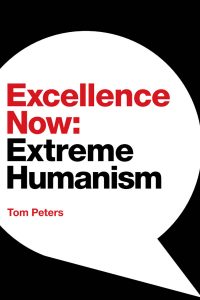
I’m going to add two seconds to this thing. When the pandemic came along, my wife was doing a lot of community stuff. I thought, “Here you are, Peter, sitting on your ass.” I didn’t pretend to have the expertise, but we started going around and saying to people with the podcasts, “Tom would like to talk about leadership in the time of COVID-19.”
Along the way, and this is a good ending point, maybe for both of us, but certainly for me, came the COVID-19 Leadership Seven. The leadership seven are be kind, be caring, be patient, be forgiving, be positive, be present, and walk in the other person’s shoes. I have said and will continue to say to leaders, “The way that you have behaved and are behaving now during this once century, we hope the pandemic will define your professional career.”
It is as simple as that. This will be the moment. How did he behave? Here is my definition of good behavior on the part of a boss. The boss is running a twenty-person group, and they have maybe even a couple of Zoom meetings a day. There is, we will call it Jane or Harry, it doesn’t matter, one of the people on my team. We have now probably had 40 meetings. Jane or Harry has always shown up and been on their seat on time.
I’m on a private call. I call Harry in. I said, “Harry, I’m going to give you some feedback. It is going to be negative feedback. Here is my negative feedback. Would you please miss some meetings? I happen to know that you got two kids at home. I happen to know that you have, which a boss ought to always know, an 80-year-old mother who is in an assisted living activity. I know that upstairs, your wife is teaching a third-grade class. Take care of yourself, your mom, and your family. It is okay not to be awesomely productive. Be late, miss the meeting, and blow us off. Not 100% of the time, but putting first things first, and first things are not an eighth of a percent productivity hit for our group.”
Thank you for that reminder and your advocacy there. Tom, it is a pleasure to have you here on the show. I enjoy it. Thank you for your time.
I thank you at least as much or more. I have been doing this several times in the book for many years. The message is straightforward. Not enough people are reading. You are giving me the opportunity to talk about the stuff that is most important in my life. I don’t know whether you got a good deal or not with this half hour. I did. I got to talk to some more people. It ain’t rocket science. I said to somebody, “I have all these degrees, but if you want to understand everything in my books, you must show me a signed certificate of graduation from the fourth grade. That is the extent of it.” Be decent. Take care of people, and play around.
You can get ahold of Michael Schrage at MIT, but there is a term of his that I should have used. He says, “The key to innovation, and this is so much on the failure thing, is listen to this term, serious play.” Trying stuff is playful. Serious play doesn’t mean being sloppy. The translation of the word play into the notion of innovation in a business enterprise or any other enterprise is a cool thing that can’t be resolved by me saying it in 30 seconds. Grab Michael if you can. He is an MIT professor. He is a good guy.
Thank you for everything that you are doing and continue to do. In the book, you said it is your last hurrah. I hope not. I’m sure book twenty will be here.
I realized while writing that this book is my memoir. It is about the ideas that I have spent many years of my life on. I have a neighbor who is a world-famous social psychologist. She is doing a memoir. She called it an ideas memoir. This is what I’ve been doing, 2,500 speeches, 7,500 flights, and 20 books. This is what I do. The only reason I will write number twenty is my frustration. It is boiling over that this is stuff that doesn’t require more than a fourth-grade diploma, and yet we don’t do it.
Whether we are atheists or six-morning masses a week people, let us pray that some of the decent things in terms of behavior that have come during this pandemic will stick. We will not unwittingly go back to business as usual. I’m down on both knees and hoping that this will turn a little bit of a corner. We have practical people reading this. All the data is clear. Do the right stuff with people and you make more money. This is not sweetness, light, and ignoring the realities of business. It works. It is not going to get you the win in the next 60 days. When we extend the timeframe to a year or a couple of years, the best behavior toward our people is plain carrying bags of $100 bills to the bank.
Thank you so much for being here on the show. I appreciate it.
The feeling is mutual. You have given me a bigger opportunity than I have given you. Thank you.
—
I want to thank the one, the only, the legendary Tom Peters for being a guest and being generous with his time here. If you want to enter to win a copy of Tom’s book, Excellence Now: Extreme Humanism, you can go to MarkGraban.com/Mistake58. If you like the episode, the best thing you can do to help me out and the show is to share this episode with a friend or a colleague. If you want to share it on LinkedIn, Twitter, or Facebook, it would be much appreciated.
I hope this show inspires you to reflect on your own mistakes and how you can learn from them or turn them into positive. I have had readers tell me they have started being more open and honest about mistakes in their work. They are trying to create a workplace culture where it is safe to speak up about problems because that leads to more improvement and better business results. If you have feedback or a story to share, you can email me at MyFavoriteMistakePodcast@Gmail.com. Our website is MyFavoriteMistakePodcast.com.
Important Links
- Tom Peters
- Excellence Now: Extreme Humanism
- In Search of Excellence
- Thriving On Chaos
- Compassionomics
- Warren Buffett Invests Like a Girl and Why You Should Too
- Quiet
- Twitter – Tom Peters
- MarkGraban.com/Mistake58
- MyFavoriteMistakePodcast@Gmail.com
- My interview with Tom back in August 2020 in my Lean podcast series
- https://Anchor.fm/favorite-mistake/support

